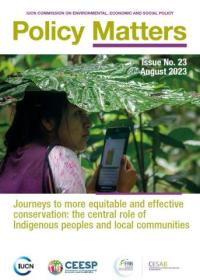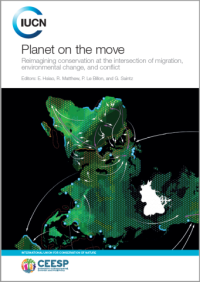About & How We Engage
CEESP members contribute to the mandate of the Commission by providing insights, expertise, and traditional knowledge as well as by promoting policies and actions that relate to the human dimensions of conservation.
ä»
ä»
ä»
ä»
CEESP members contribute to the mandate of the Commission by providing insights, expertise, and traditional knowledge as well as by promoting policies and actions that relate to the human dimensions of conservation.
ä»
ä»
ä»
ä»
Our Vision
A world where sustainability, social justice, diversity and equity are valued in nature conservation and in development.
Our Mission
To contribute to the üСÜꪤüýò¢ˆ§Ý§Ã¿«üø°ÀøÝýË mission by generating and disseminating knowledge, mobilising influence, and promoting actions to harmonise the conservation of nature with the critical social, cultural, environmental, and economic justice concerns of human societies.
Our Structure
The work of the Commission is organised into Regions andä»Themes that focus on key directions to meet CEESP's mandate. Specialist Groups, Task Forces and Working Groupsä»each operate under a related Theme.
We work closely with the üСÜꪤüýò¢ˆ§Ý§Ã¿«üø°ÀøÝýË Secretariat, üСÜꪤüýò¢ˆ§Ý§Ã¿«üø°ÀøÝýËãs Regional Offices, other Commissions, and üСÜꪤüýò¢ˆ§Ý§Ã¿«üø°ÀøÝýË members to realise the Unionãs One Programme Charter. Our work is based on the CEESP Mandate 2021-2024.ä»

Reimagine Conservation mobilizes the Union and beyond to transform our thinking, engagement, and practice to protect the planet, and contributes directly to 2021-2024 Programme and the 20-year vision of üСÜꪤüýò¢ˆ§Ý§Ã¿«üø°ÀøÝýË.ä»

CEESP advances evidence-based dialogue and practice related to human rights and conservation to transform how conservation is done with people, while elevating the social impacts in order to protect the planet.

CEESP advances the dialogue around conservation finance and makes funding more inclusive for Indigenous peoples and local communities (IPLCs), youth, and women in order to achieve our climate and biodiversity goals.

CEESP advances dialogues and evidence-based research for what conservation leadership needs to look like in the future to support the protection of the planet.
CEESP is a unique network of approximately 1,200 volunteers representing perspectives and disciplines from biology and anthropology, economics and law, to culture and Indigenous peoples - among many others. Our work represents the crossroads of conservation and development.ä»Our members offer resources and expertise to meet the challenges of conservation.
ä»
Membership in CEESP is open to any individual who has relevant experience and has skills determined important to the work of a Thematic Group, Specialist Group, Region or the Commission as a whole. Membership applications are reviewed by the Regional Vice Chairs.








Kristen provides leadership on a range of policies and practice related to Indigenous Peoples and local communities, gender, human rights-based approaches, social safeguards, and engagement with the peace and development community. Effective conservation can only occur with and through the cooperation of Indigenous peoples and local communities living in and around protected areas ã and elsewhere. Support of women as conservation stewards and decision-makers is central to this work.ä»
ä»
Throughout her 25-year career, Kristen has advocated effectively and globally to improve the engagement of indigenous peoples and local communities in conservation through a human rights-based approach, and a focus on people-centered conservation. Since 2016, Kristen has also powerfully committed herself to the (üСÜꪤüýò¢ˆ§Ý§Ã¿«üø°ÀøÝýË) in her elected role of Chair of the , promoting research and policies to balance nature conservation with socioeconomic and cultural concerns. Under her tenure, the Commission has supported the Unionãs Members, supported all seven Commissions, advanced work with Indigenous Peoples Organization Members, engaged in research around well-being and conservation, peace and migration and governance. ä»
ä»
Kristen is the Senior Vice President for the at (CI). For more information on her work with CI, visit . Kristen holds a degree in Latin American Studies and Anthropology from George Washington University. She was a Cotlow Scholar in 1996, a Fulbright Scholar in 1997-1998 and is a Senior Fellow with the Environmental Leadership Program. She serves on several boards, including the Equator Initiative, the Bushmeat Crisis Task Force and the Chol-Chol Foundation.ä»
Kristen provides leadership on a range of policies and practice related to Indigenous Peoples and local communities, gender, human rights-based approaches, social safeguards, and engagement with the ...
Iben Munck's background is in international tourism and nature conservation.ä»Decades of travel and living in different cultures and countries provided her with a deep commitment to community empowerment and nature conservation.ä»
Iben Munck's background is in international tourism and nature conservation.ä»Decades of travel and living in different cultures and countries provided her with a deep commitment to community ...